|
|
|
Sort Order |
|
|
|
Items / Page
|
|
|
|
|
|
|
| Srl | Item |
| 1 |
ID:
137183
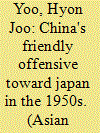

|
|
|
|
|
| Summary/Abstract |
This article explores why the People's Republic of China employed a surprisingly soft and lenient policy toward Japan in the 1950s despite their historical and political animosities. Relying on a relatively new concept in the study of international relations, I argue that China's conciliatory policy toward Japan represented a wedge strategy that was designed to detach Japan from the United States and weaken the US-Japan alliance. The logic of the theory also reveals that China's policy was in line with its “united front” against the United States during the Cold War.
|
|
|
|
|
|
|
|
|
|
|
|
|
|
|
|
| 2 |
ID:
137185
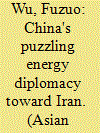

|
|
|
|
|
| Summary/Abstract |
China, the world's largest energy consumer, has sought to build up its ties with all energy-rich countries. But China's energy diplomacy toward Iran, one of its largest oil suppliers, is puzzling. On the one hand, China has gone all out to strengthen its ties with Iran in spite of international efforts to isolate Iran because of its controversial nuclear program. On the other hand, China not only has voted against Iran at the International Atomic Energy Agency and the United Nations Security Council on the nuclear issue, but also has cut its oil imports from Iran. The main explanation for this apparent contradiction is US pressure. China has yielded to the pressure because the United States and its allies are much more important for China's economic development and energy security than is Iran.
|
|
|
|
|
|
|
|
|
|
|
|
|
|
|
|
| 3 |
ID:
137188
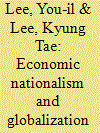

|
|
|
|
|
| Summary/Abstract |
In this article we explore whether South Korea's long-standing tradition of economic nationalism remains an appropriate development strategy, or whether this approach has been rendered irrelevant by the current wave of neoliberal globalization led by multinational corporations. We examine the changed economic agendas of each Korean regime, with a particular focus on national identity and economic nationalism, mobilized and implemented by the state. We argue that, despite the rapid development of globalization and cosmopolitanism in South Korea, economic nationalism is still prevalent. Korea's adoption of neoliberal economic activities, such as lifting trade barriers to encourage the inflow of foreign direct investment, was necessary to assist certain areas of the economy. Furthermore, changing the direction of the growth trajectory remains subordinate to the goal of state building. Empirical analysis of results collected from survey data and one-on-one interviews conducted in 2010 help to validate our hypothesis.
|
|
|
|
|
|
|
|
|
|
|
|
|
|
|
|
| 4 |
ID:
137187
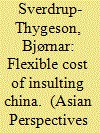

|
|
|
|
|
| Summary/Abstract |
In this article, I investigate trade relations between Norway and China after the 2010 Nobel Peace Prize was awarded to Liu Xiaobo, a leading Chinese dissident. It is a case study of China's political use of economic levers in its international relations. Concluding that Sino-Norwegian trade relationship did not suffer the severe impact that many predicted, I argue that the threshold for China to enact punitive economic actions seems higher than is often acknowledged. China's sensitivity is to the costs and benefits of the relevant country's trade.
|
|
|
|
|
|
|
|
|
|
|
|
|
|
|
|
| 5 |
ID:
137184


|
|
|
|
|
| Summary/Abstract |
When North Korea conducted its third nuclear weapons test in 2013, observers commented that China's foreign policy toward North Korea was becoming tougher. That is an exaggeration. China's harsh rhetoric and concrete actions directed at North Korea following the nuclear test were short-lived and outweighed by its positive attitude and approaches to the North. Chinese leaders accentuated the mutual comradeship between China and North Korea, the Chinese public remained favorable to the North, and bilateral transactions continued. China has not changed its basic policy toward North Korea and is unlikely to do so in the near future.
|
|
|
|
|
|
|
|
|
|
|
|
|
|
|
|
| 6 |
ID:
137186
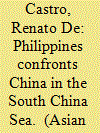

|
|
|
|
|
| Summary/Abstract |
Using the Scarborough Shoal standoff between China and the Philippines as a case study, in this article I examine two approaches to addressing territorial disputes—power politics and liberalismlegalism. China, a major power, uses realpolitik to press its expansive claim in the South China Sea. The Philippines, a small power, adopts the liberal-legal approach that seeks to balance against China. During the standoff, China drove the Philippines out of the shoal, though stopping short of an armed clash, and effected a de facto occupation of the contested area. As a countermeasure, the Philippines filed a statement of claim with the International Tribunal for the Law of the Sea. The confrontation was a test of Thucydides's age-old aphorism that “the strong do what they have the power to do, and the weak accept what they have to accept.”
|
|
|
|
|
|
|
|
|
|
|
|
|
|
|
|
| 7 |
ID:
137189
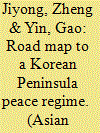

|
|
|
|
|
| Summary/Abstract |
Sustainable peace and stability need an institutional guarantee. Based on the unique logic of its Korean peninsula policy, China has sketched a Chinese-style Korean Peninsula Peace Regime that comprises logic positioning, strategic objectives and priorities, a mechanism, a timetable, and a road map. The basic logic of the peace regime, the aim of which is long-term peace and stability on the Korean peninsula, is that it should include security but also integrate security with economy and culture.
|
|
|
|
|
|
|
|
|
|
|
|
|
|
|
|
|
|
|
|
|